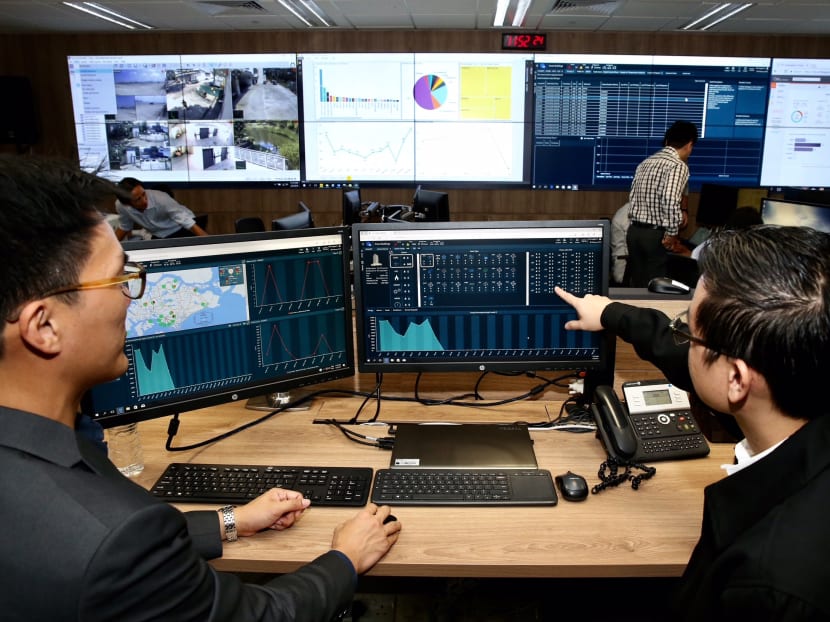One-stop command centre to manage building facilities the way to go: Desmond Lee
SINGAPORE – Since implementing smart technologies in its buildings’ facilities management two years ago, JTC has saved some S$400,000 in its utilities bill, and notched 15 per cent in savings in productivity and energy costs. Housed in a single command centre with functions such as building and estate operations, the smart facilities management (FM) systems allow the company to centrally and remotely monitor, and optimise the performance of its buildings, including its air conditioners, lifts and pump systems.

J-Ops Command Centre, one of the first command centres set up for facilities management in Singapore, taken during the Launch of the Real Estate Industry Transformation Map (REITM) and Commissioning of J-Ops Command Centre at The JTC Summit on Feb 8, 2018. Photo: Koh Mui Fong/TODAY
SINGAPORE – Since implementing smart technologies in its buildings’ facilities management two years ago, JTC Corp has saved some S$400,000 in its utilities bill, and 15 per cent of its productivity and energy costs. Housed in a single command centre with functions such as building and estate operations, the smart facilities management (FM) systems allow the company to centrally and remotely monitor its buildings, and optimise their performance, including the air conditioners, lifts and pump systems.
There is also an estate-monitoring system that has integrated customised video analytics to alert of potential security breaches.
The pilot project of its three buildings, JTC CleanTech Two, JTC MedTech Hub and JTC Summit, cost S$1.5 million to customise and implement. But the investment has since paid off, with its yearly utility bills of around S$2.5 million going down to about S$2.1 million, among other cost savings.
JTC’s J-Ops Command Centre, which was unveiled by Second Minister for National Development Desmond Lee at the JTC Summit on Thursday (Feb 8), was cited as an example of the transformation seen in the FM sector, a key area identified in the real estate industry transformation map (ITM) launched on the same day.
Mr Lee said in his speech: “As JTC is clearly showing, the clever use of technology and the sensible use of data analytics can unlock many possibilities for the efficient management of buildings and facilities, and more efficient systems mean lower lifetime costs.
“We want to encourage greater adoption of smart facilities management – or Smart FM.”
Mr Lee also said that convincing more landlords to invest in smart FM will help drive research and development, and nurture innovative enterprises in this area. In turn, this “can create new jobs, new ways of doing things, new firms, new niche industries”, he added.
JTC had embarked on the transformation in 2013 in a bid to seek more sustainable and productive solutions to handle its growing property portfolio, which had grown from 1.3 million sq m in 2013 to over 5 million sq m as of last year. It also had to grapple with other issues such as manpower constraints, rising operation and energy costs.
JTC, which manages 106 buildings and developments as of Jan 1, rolled out the concept to 20 other buildings in its portfolio this month. It plans to integrate the technology into 39 of its buildings, at a cost of about S$15 million, by the first half of this year.
The smart technologies have also helped JTC staff grow their capabilities and learn new skills.
In 1995, Mr Muhammad Shaban joined JTC as a lift technician and he was tasked with ground work and maintenance of lifts. Today, the 45-year-old is the assistant manager for J-Ops, where he oversees the system, analyses the root cause of issues, and monitors the performance of facilities through computers.
He also guides technicians and manages the various properties in the command centre. “Initially I was worried about the job as it was a different thing,” he said. But with support and training from his bosses, and after getting past the initial stages of familiarisation with the systems, Mr Shaban said he had “upskilled” with the system’s new capabilities.
As the FM industry is a very competitive one, Mr Tony Khoo, president of the International Facility Management Association (Singapore Chapter) said that can result in lower prices, and less pay for workers.
He said: “There is less from a company’s perspective to invest in individual workers to upgrade their skills. It is difficult for the people (in the industry) to upgrade.”
While the sector hires mainly Singaporeans, said Mr Khoo, it is challenging for companies to hire local help. “What we need to do is to upskill the current people so that they can move forward with the technology,” he added.









